Jeff’s Work
One of my main roles here has been to find trades which will bring some income and continuous sustainability to very poor families. Regular jobs in shops and cafes are taken by the owners’ family and friends, while jobs in banks, etc require an education and an ID document, neither of which poor families tend to have. After discussing many ideas with the UK and Ethiopian NGO teams, the two trades agreed upon have been mending clothes (with a sewing machine set up on a street) and washing/ironing clothes. Seemingly simple trades but ones fraught with difficulty! The sewing machines available in Ethiopia look like they belong in a history museum and are crazily expensive – I traced on the internet one of the machines priced at $300 to India where it cost just $30. None of those sold here are available in the UK. Importing is not viable because of the import duties and shipping costs and mostly because of the bureaucracy which reportedly would delay the start of trades by 6-12 months. Washing and ironing is not much simpler given that families typically have no access for several days to water (which we will manage by purchasing containers) and also electricity. Ironing tables also had to be brought back from Addis as none was available in Gondar. Tasks which can take just a few minutes in the UK, especially given our access to online shopping, can take weeks or more to resolve in Ethiopia.
With trades chosen, the next step was to choose families willing to accept a micro loan for the sewing machines, irons, etc and to be trained in the trades and in literacy, numeracy and general business practice. This is another tough area. Families are assessed as “needy” or “very needy” by local councils for the purpose of being suitable for sponsorship or micro loans. However , the lists created are subject to significant suspicions of nepotism, so the NGOs we volunteer for make their own independent assessments of poverty levels. I have spent several days revising how such assessments are made. For example, one of the questions, “does the family own a television” needed to consider if the television works as nearly all the poor families who own a television have a broken one which they use as a status symbol. Another question, “how many beds do you own”, did not consider whether those beds have mattresses which many cannot afford. More important are the questions about food as the old assessments did not consider that parents often forego meals in order to feed their children.
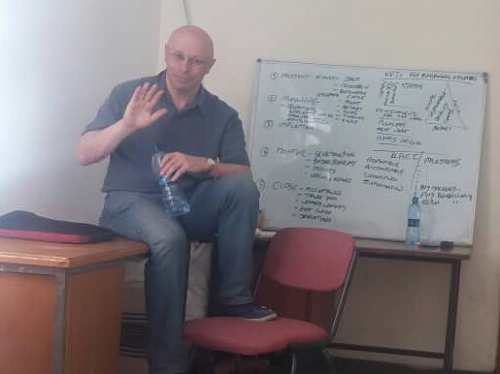
Another role I have had is to train NGO staff in the principles of project management. I am not sure if the staff will thank me for introducing status reports for them to complete every week but they will at least give their UK trustees better awareness of the great work and achievements the staff here make. During one of my presentations, I spoke on the subject of RAG (Red Amber Green) statuses which are used globally to indicate whether a project is progressing well (Green meaning good and Go, Red meaning problem and Stop to discuss, with Amber somewhere in between). After I introduced this topic, I quickly realised from the blank looks that no one had ever seen a traffic light! So ,I then had to step back and explain how cars stop at red lights and go only when they turn green. I learnt a big lesson there in not making presumptions based on my own experience.
When I have not been literally “on the road” interviewing sewers, visiting families or in NGO offices, I have been working from the terrace of our hotel. It looks convivial and can be a pleasure with the waitresses serving water and chai with huge smiles especially when I order in Amharic. But my “office” is not always so peaceful. Some locals often sit around the terrace speaking incredibly loudly on their mobile phones. If my Amharic was better, I would say to them that if they spoke any louder, they would not need a phone.
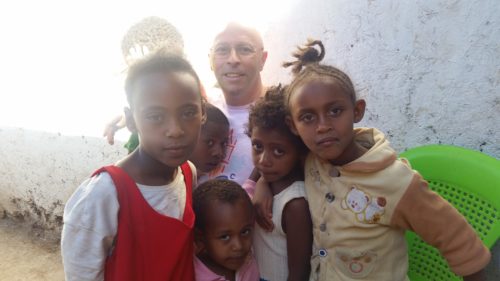
My favourite moments are spent visiting the after school club where Sylvie works. For the first time in 50 years, I jumped several times over a long skipping rope swung on each end by two of the children. For some reason, it made me more tired than it did 50 years ago. The kids there are great, they always greet me with amazing smiles and they have strangely all come to call me Paul Pogba after the superstar Manchester United player. I don’t see any resemblance myself, but I am definitely accepting the name. I have also taught the club teachers how to play chess – it’s way too difficult to teach the game to those without English, but at least this way, the teachers can teach the children and hopefully find gifted kids like in one of my favourite films, “Queen of Katwe”, a true story about a young African chess champion.
Sylvie’s Work
I have been assisting at an after school club for children who attend Government schools for half days in classes of 60-90 and who therefore can do with help. The children are delightful but a real handful to manage as discipline with no amharic at my command lets them do pretty much as they please during a class. Teaching them English or even art without Amharic has been fraught with difficulty and I’ve often needed a translator or better, a child who understood what I wanted and could explain it to the others. Still, there have been some lovely moments. When teaching painting techniques, while many of the kids mucked around, two children completely “got it”. Their eyes lit up and the artwork they produced was amazing. Here’s a picture drawn by a really young girl who calls me Silibi – every Ethiopian we have met has difficulty in connecting consonants without adding vowels in between. I’ll accept Silibi which is kind of sweet, but I wasn’t too happy when someone called me Seliva!
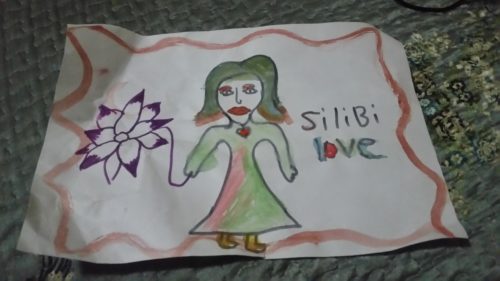
I have also been trying with mixed success to spruce the club up a little. I’ve come to accept that the pit latrine can’t be replaced (although that in itself was a major improvement when it was installed as before that, the children had nowhere to go) but with my colleagues we have purchased the materials to build a concrete sink and to install a tap and water tank for the children to wash themselves. The classrooms are really too dark for the kids to work in, so we decided to paint the walls white. Disaster! The Ethiopian tradition is to mix paint with lots of water, so the walls ending up looking worse than before! The idea of adding ceiling lights was quickly rejected because of cost, so I suggested an uplight. After blank looks, I discovered there are no uplights anywhere in Ethiopia! Not wanting to just give up, I designed an uplight and went to a metal worker who made a great one for just $10. Success! But maybe not. As the kids have never seen an uplight, my colleagues have no doubt they will start to pull the cable and break the light. The problems never end!
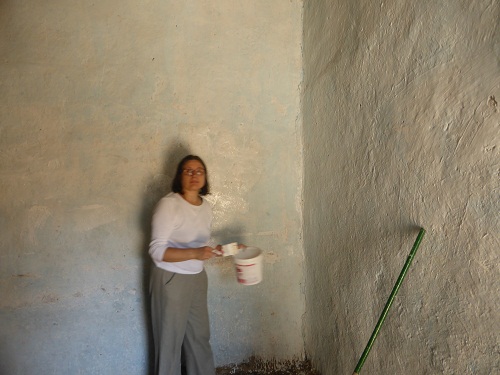
I have been given a couple of challenging requests by the children to help them with their homework. One was to help them to draw a traditional Ethiopian wedding when of course I had no idea what that looked like, but it was a good experience for me to learn how the bride rides a horse while shielded with an umbrella by a close male relative. Another request from children with biology homework was to draw poster size male organs in detail! There was no laughter or rudeness as I have come to expect in a British school, but it was still not an experience I’d like to repeat…it is awfully intricate and hard to draw down there! We have also finally received the two lockable cupboards that we had ordered back in January. These will let us store stationery, folders etc on shelves which were lacking until now. It will free a couple of tables to use in the classrooms and will allow us to take stock of the resources we do have and make a list of what is needed. Hopefully, it will also help us keep the office space tidy.
Being a “farangi” (foreigner), the “racism in reverse” mentality has meant some children approaching me for help with the false idea that I could do more for them than my amazing colleagues. One girl showed me a big bump and cut on her head and told me that her father refused to take her to hospital, while another boy of 15 years old told me that he has no home to sleep in as his parents have abandoned him and left him in the care of an older sister who has now also left. Every story is heartbreaking. My colleague had to speak to the girl’s father who agreed to go to the hospital if our NGO paid the costs of treatment and transport (which of course we agreed to) and we are now trying to find sponsorship to allow the young boy to live in a safe place and to continue his education. Once again, the problems never end!
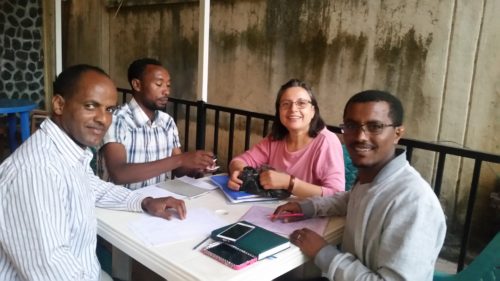
Three evenings each week, I have been teaching English to adults. I’m not sure how much they have improved, but the lessons have been good fun for them and me. One of my lessons on English verbs took my pupils through the steps of the Ethiopian coffee ceremony which I guessed they would be very familiar with. How wrong I was! Being men, all they really knew was how to drink the coffee made for them by women! So, their homework that evening was to ask their wives how they make coffee, and in the next lesson, they learnt the verbs for the 18 steps in making and drinking coffee. For the record, here they are!
1. Light the charcoal fire
2. Fan the fire as needed throughout
3. wash the coffee beans
4. make popcorn
5. Put grass on the floor
6. Roast the coffee beans
7. Grind the beans with a pestle and mortar (or nowadays a coffee grinder) to a rough powder
8. Boil the water
9. Put the coffee into the water
10. Brew the coffee for 10 minutes
11. Wash the cups
12. Light some incense
13. Pour the brewed coffee into a traditional clay serving pot.
14. Place the serving pot back on the fire
15. Give the cups to each guest in order of seniority and add an extra one for the zars or spirits
16. Pour the coffee into cups from high to form a foam and to splatter the saucer and tray (also for the zars,)
17. Give the popcorn to each guest
18. Drink the coffee after adding sugar as needed.
The ceremony normally lasts at least 45 minutes during which the guests will drink three cups of coffee of diminishing strength. The first cup called Abol is made with the first brew of the coffee. Once this cup of coffee has been drunk, more boiling water is poured onto the coffee grinds, the coffee is brewed and heated again and this second cup called Tona is drunk. For the third cup, the hostess pours the zars’ drink back into the coffee pot and adds more water. The resulting third light, sweet cup of coffee called Bereka is served. After the final cup, the guests are free to leave and not expected to linger.
Previous Posts
- Butterflies in Basilicata May 29, 2025
- Caribbean Adventure March 19, 2025
- Cyprus in Winter: It sure ain’t Baaa-d December 12, 2024
- Croatia – Love at First Bite October 1, 2024
- Greek Islands June 12, 2024
- Further Adventures in India March 28, 2024
- Tamil Nadu February 21, 2024
- Pet Sitting in Nordic Countries August 20, 2023
- A Hindu Wedding in Bangalore May 7, 2023
- Guatemala March 5, 2023
- Israel December 22, 2022
- London, Helsinki, Tallinn, Munich September 22, 2022
- Weddings July 11, 2022
- Ecuador March 22, 2022
- From Galapagos with Love March 1, 2022
- Galapagos Stories March 1, 2022
- Belgium, Netherlands, France, UK, Spain December 25, 2021
- American Dream? August 20, 2021
- Costa Rica – Hasta La Vista May 29, 2021
- Costa Rica – We have Arrived February 28, 2021
- Ciao! January 1, 2021
- A Portrait of Berlin January 1, 2021
- Horse Whispering September 17, 2020
- Going Dutch September 17, 2020
- Charity References July 11, 2020
- Pet Sit References July 11, 2020
- Workaway References July 11, 2020
- Staying at Home? June 8, 2020
- India Travels January 20, 2020
- Memories from Mother India January 20, 2020
- Party Time November 15, 2019
- Volunteering in Udaipur October 20, 2019
- Pet Sitting October 3, 2019
- Photos and Stories from our Camino June 12, 2019
- Camino de Santiago May 27, 2019
- Things in Ethiopia we will Miss Most and Least February 25, 2019
- Volunteering in Gondar February 6, 2019
- Timket – Short Post February 6, 2019
- Timket – Long Post February 6, 2019
- Simien Mountains January 14, 2019
- Photos of Gondar January 3, 2019
- No Christmas in Ethiopia Yet December 25, 2018
- Ethiopia: First Impressions December 20, 2018
- Pet Sitting Ideas December 7, 2018
- Storage Ideas December 7, 2018
- Close Encounters December 7, 2018
8 Comments. Leave new
Good Going Sir and Maam …..
Great post! Nice to meet you both in Gonder and best of luck with your endeavors!
I am very happy to meet you and got a lots of experience from you. Your help was very success. Hope I will see you again next year.
Thank you for everything you did. Missing you
I found your site from Google and also I need to claim it was an excellent discover.
Thanks!
Your internet site has exceptional material. I bookmarked the website
So very interesting dear friends! So much to learn ..
always if we want to.. looking forward to seeing you somewhere! Love from Argentina!
Found reports of both of you very informative as I did not see any of those things when I worked in Asmara which is a pretty modern town with wide tree lined avenues. Following your talk at Marlborough Rd I sent a donation to Rabbi Sheridan and hope it helped towards the needed school equipment. I have only just seen your informative blogs (India & Spain)as Reeva sent me the links last week. If you are interested to see something of Asmara just search ‘Kagnew Station’ on You Tube or Asmara. Carry on the good work you are both doing.
Thanks Alex. Asmara seems more modern in 1958 than Gondar is today! When were you there and what were you doing? We can chat when we see you next. Take care!